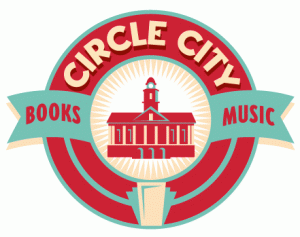After several weeks of fine-tuning, I’ve finally got a logo. That means I can start working on the signs that will go on and around the building. Our graphic artist came up with a much better design than what I had in mind when I presented him with my rough idea. My wife and daughter went back and forth over colors and details and, I think, everybody is happy. We’ll see what it looks like four feet high.
 As time passes, and word spreads of my existence, I am getting more calls from people who want to unload their books. I’ve seen a lot of worthless books over the past month. The hope that, at long last, someone might actually pay money for torn, wet or coverless books is a powerful incentive for some people to lug boxes downtown. Several times sellers with large boxes have told me they had some good books, but since I wasn’t the first store they visited, they’re gone now. This seems an odd admission for someone to make, if they want me to buy their books. But I suspect their desire to profit isn’t as great as the embarrassment they feel showing me such lousy books.
As time passes, and word spreads of my existence, I am getting more calls from people who want to unload their books. I’ve seen a lot of worthless books over the past month. The hope that, at long last, someone might actually pay money for torn, wet or coverless books is a powerful incentive for some people to lug boxes downtown. Several times sellers with large boxes have told me they had some good books, but since I wasn’t the first store they visited, they’re gone now. This seems an odd admission for someone to make, if they want me to buy their books. But I suspect their desire to profit isn’t as great as the embarrassment they feel showing me such lousy books.
Today I visited Trenton, North Carolina, population 200. Judge Walter Henderson, a commercially unsuccessful novelist, passed away some months ago, and his nephew needs to liquidate the estate. I was called by a mutual friend, and after a three-hour drive, I spent a couple of hours in the judge’s library. It was located on the first floor of the old Trenton railway station which, after the station closed, was bought by the judge and moved out into the country where he made his home, overlooking the Trent River. The books were situated just by the ticket window, across from the freight entrance. My calculation was that an educated, well-to-do judge, with a literary background, was just the sort of person who might have a library full of signed William Faulkner books. This was not the case, however. He did love Faulkner, but most of his books were recent reprints. I took a few books, and agreed to pay the nephew fifty cents each for a couple hundred more, were he to bring them to Pittsboro. It was an interesting trip, nonetheless, and one I will keep making, if there seems a reasonable chance of finding something special.
I am often asked this question, regarding the opening of my new store: “Will you be specializing in anything?” Since the answer to this is “no,” I usually end up sensing some surprise and misgiving when I admit this. To most people, this seems like a mistake. There’s an unstated subtext here: that since bookstores are closing everywhere – with fewer and fewer people buying books – a store can’t succeed without a niche, a narrow specialization that gives it a way to draw avid customers from a wide region, rather than hoping for the steady traffic of local readers.
We’ll find out if this is the case, or at least I’ll know that it’s not the case if I am still in business in five years. But for now, my vision for this store is that of a wide-ranging, general interest bookstore, and any specialization I develop will result from what I learn are the interests of my customers.
One thing I will always try to have are books about bookstores; fictional bookstores that is. My favorite is George Orwell’s “Keep the Aspidistra Flying.” This is a 30s era social commentary whose main character, Gordon Comstock, works in a second-hand bookshop. Comstock despises his customers for their middle-class tastes and their willingness to accommodate themselves to their dull middle-class lives by reading mind-numbing fluff. I aspire to a more generous relationship with my customers. And mind-numbing fluff is not the worst thing in the world.
Christopher Morley’s “The Haunted Bookshop,” is another gem, this about WWI spies who use the store for secret drops. Then there is Penelope Fitzgerald’s “The Bookshop,” in which a middle-aged woman opens a bookstore in a small British town, and finds herself strangely unwelcome. Mary Sarton’s “The Education of Harriet Hatfield,” explores a similar scenario, though in Boston. There are several others I could name and, of course, many more that I’ve never read. I would add also the scene in Raymond Chandler’s “The Big Sleep,” in which Philip Marlowe visits A.E. Geiger’s bookstore and meets a female clerk who “walked with a certain something I hadn’t often seen in bookstores.” I expect that’s still the case, at least until we get our first Hooters Bookstore.

and one of my faves… 84 Charing Cross Rd by Helen Hanff. A love affair with literature and used books and the kindness shared in the exchange between seller and consumer.